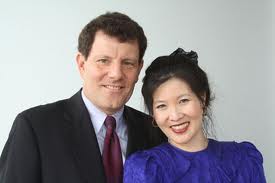 “We have all won the lottery of life,” Sheryl WuDunn said she criss-crossed the stage during her recent appearance at Kent State University’s presidental speakers series. Her husband and co-presenter, Nicholas Kristof, sat off to the side and nodded in agreement. “Once you have most of your material needs met, as most of us sitting here have, there are few things that actually elevate your level of happiness, and one of those things is contributing to a cause larger than yourself.”
“We have all won the lottery of life,” Sheryl WuDunn said she criss-crossed the stage during her recent appearance at Kent State University’s presidental speakers series. Her husband and co-presenter, Nicholas Kristof, sat off to the side and nodded in agreement. “Once you have most of your material needs met, as most of us sitting here have, there are few things that actually elevate your level of happiness, and one of those things is contributing to a cause larger than yourself.”
Co-authors of Half the Sky: Turning Oppression into Opportunity for Women Worldwide, WuDunn and Kristof are a powerhouse couple. The pair won the Pulitzer Prize in 1990 for their coverage of China’s Tiananmen Square protests; Kristof went on to win an individual Pulitzer in 2006 for his Dafur genocide coverage as a New York Times columnist. The first Asian-American to win a Pulitzer Prize, WuDunn currently serves as a senior managing director at Mid-Market Securities, a boutique investment firm.
WuDunn and Kristof lived in Beijing in the early 1990s and were struck by the degree to which inequalities were targeted at girls. While there, they traveled to a small, rural village and met DiMon Ju, a bright sixth-grader forced to stay home from school because her family could not afford the $13 annual tuition.
Kristof wrote about Ju’s plight and the implications for hundreds of thousands girls just like her in his column. Soon after, letters from readers poured in, many containing $13 checks.
And then, there was one wire transfer of $10,000. Hurriedly, Kristof and WuDunn set up a fund to keep thousands of girls in school. It wasn’t until they called the donor to thank him for his generosity that they learned there had been a mistake: the donor only sent $100. A banking error was the source of the misunderstanding. Kristof quickly secured a donation of the difference from the bank’s president.
That village and the surrounding communities, Kristof noted, have improved drastically since the 1990s, but that particular village that received donations has seen the most progress, a feat Kristof credits to the increased education of girls and women. “The central moral challenge of the world is the oppression of women and girls worldwide,” Kristof said. “Gender discrimination is lethal.”
Kristof and WuDunn exposed the crowd to the horrors of human trafficking—girls as young as toddlers being kidnapped and sold to brothels, where they have no say over the sexual acts they are forced to perform on often violent customers. The couple urged the Kent State community to join the fight for women’s rights.
“I bought two Cambodian girls from a brothel,” Kristof said. “I bought one for $150 and the other was a little over $200. I got receipts. When you get a receipt for buying another human being in the 21st century, something is profoundly wrong.”
